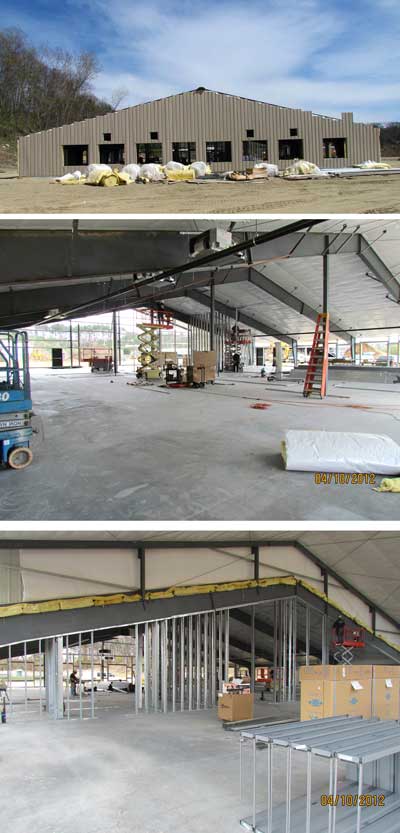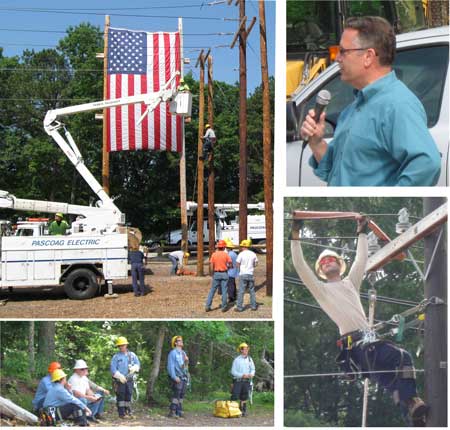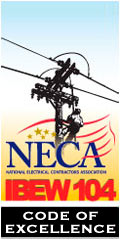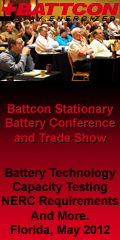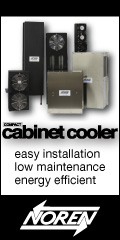NEPPA eNewsletter
May 2012
|
On Apr. 26, NEPPA president and general manager of Norwich Public Utilities John Bilda testified at a Senate Energy and Natural Resources Committee hearing on utilities’ response to weather-related electrical outages. The hearing was scheduled in response to a request from Sens. Jeanne Shaheen (D-NH) and Richard Blumenthal (D-CT), and featured testimony from Blumenthal and Patricia Hoffman, who heads the Department of Energy’s (DOE’s) Office of Electricity Delivery and Energy Reliability; Norman Bay, Director of the Federal Energy Regulatory Commission (FERC) Office of Enforcement and Tom Getz, former Chair of the Public Utilities Commission of New Hampshire. Copies of the witnesses’ testimony and an archive of the hearing can be viewed on the committee website. In addition to Blumenthal and Shaheen, Chairman Bingaman (D-NM), ranking member Lisa Murkowski (R-AK) and Sens. Maria Cantwell (D-WA), John Barrasso (R-WY), Al Franken (D-MN), John Hoeven (R-ND) and Joe Manchin (D-WV) attended the hearing. Sen. Blumenthal held Norwich Public Utilities out as an example of one utility that got it right after the storms, restoring power to most customers within 48 hours while others were without service for more than 14 days. In his testimony, Sen. Blumenthal called on Congress to review the Mutual Assistance Groups (MAG) process for investor-owned utilities to ensure that every state is prepared, and encouraged FERC to provide clear guidance to allow development of micro-grids, which use distributed generation to provide power during emergencies. Chairman Jeff Bingaman (D-NM) noted that most of these outages were distribution-related events, which he said did not mean that the federal government is not concerned about them or could not help in responding to them. He noted that he is interested in learning how the reporting systems work and how they may be improved. DOE’s Hoffman fielded several pointed questions about the role her office plays in managing weather-related electrical outages. She said, "DOE plays a vital role, in coordination with other Federal agencies and industry, to prepare for and recover from such electric power outages." Sen. Shaheen pressed her on the need for more uniform data collection, but Hoffman said, "We are trending in the right directions." Utilities need to inform their customers first, then regional entities and then federal entities, to help DOE understand what is happening on the ground, she said. John Bilda’s testimony focused on Norwich’s response to Hurricane Irene and why Norwich was able to get the lights back on while others were without power for days. Bilda pointed to Norwich’s aggressive collaboration efforts with various entities, such as first responders, employee bargaining units, local officials and industry peers to develop a central, streamlined response process. He also encouraged development through organizations like NEPPA, which have well-organized and effective mutual aid systems. As an electric distribution company, Norwich does not own any transmission lines and relies on intra-state and interstate transmission lines that are controlled by ISO New England and transmission owners for the delivery of power. Bilda discussed how Norwich is using "micro- grid" technologies and distributed generation to provide power when a transmission line is down. Bilda also requested clarification of regulations regarding appropriate use of micro grids from FERC and ISO-New England so that utility companies can depend on them for reliability – including during times of weather-related outages. Ranking member Lisa Murkowski (R-AK) expressed frustration that the hearing had been scheduled before an upcoming FERC report on the storms in New England which could have shed light on the subject. She noted that the report would be released in four weeks, and felt the Committee should have waited as it would have helped determine the appropriate federal nexus for a hearing. Murkowski clearly was of the view that the scope of the hearing was outside the Committee’s jurisdiction – weather-related outages are typically a problem associated with distribution lines, which are not federally regulated. Murkowski also took the opportunity to highlight her work to get the Environmental Protection Agency (EPA) to look at the cumulative impacts of EPA regulations on electric reliability. Murkowski restated her intent to draft "safety value" legislation to ensure grid reliability. Chairman Jeff Bingaman (D-NM) and Sen. Shaheen seemed intent on identifying a federal role in distribution outages, repeatedly asking the panel of witnesses if various solutions would be appropriate. Shaheen emphasized the need for better data collection on outages and suggested the need for federal standards and enforcement. Bilda and the other panelists refused to take the bait and repeatedly expressed the importance of local control, and the bifurcation between federal and state jurisdiction over high-voltage transmission versus distribution assets. ##SHARELINKS##
|
|
Dr. William Strauss, economist and scheduled speaker at NEPPA’s 2012 Annual Conference, has been honored for his work on the economic and environmental benefits of converting from fossil fuels to bioenergy. The International Biomass Conference & Expo, held in Colorado in April, gave him the Excellence in Bioenergy Award based on his ability to go above and beyond in his efforts to drive the conversation in the biomass industry, said Tim Portz, program director for BBI International. "He’s been a consistent voice with a common-sense approach," Portz said. Strauss is scheduled to speak at NEPPA’s conference on biomass energy and the economic growth, energy independence and environmental stewardship for Maine and its neighbors. He is chief economist of the Biomass Thermal Energy Council and president and founder of FutureMetrics. He is also a co-founder and a director of Maine Energy Systems, chief economist for the Biomass Thermal Energy Council (Washington, DC), and the chief economist for the Maine Pellet Fuels Association. Strauss is one of three industry experts who will discuss fuels of the future at NEPPA's three-day conference planned for Sept. 16-19 at Sunday River Resort in Newry, Maine. Watch your mail for more information or click here for more information. ##SHARELINKS##
|
|
As we head into the summer the reality of NEPPA’s training facility becomes more real. Since the attached photo was taken the windows have gone in, interior framing is done and rough electrical and dry wall has begun. The current projection is to have an occupancy certificate in early July. We have begun the process of putting together our training areas. Thanks to the generosity of Groton, Conn., we will be adding a substation to our new facility sometime later this year. We will also be adding confined space and metering lab areas. Our first program is currently scheduled to be the August fourth year apprentice class. I am currently reaching out to procure items like poles and other necessary training facility materials for us to create the ultimate hands-on training environment. ##SHARELINKS##
|
|
Thomas E. Desilets, 59, of Lancaster and Framingham, Mass., passed away on April 15, 2012 after a long illness. He was a senior manager at Shrewsbury Electric Light and Cable and was active for many years in NEPPA programs and events. "Tom always had a joke ready and a kind word for friend or coworker," said Jackie Pratt of SELCO. "He will be missed." Desilets was born in Framingham, son of Elliott and Margaret (Malloy) Desilets, and is survived by his son and former wife Marcia, two stepchildren and five brothers and their spouses. In addition, he is survived by his devoted aunts and uncles, many beloved nephews and nieces and many dear cousins and friends.Desilets received a B.A. from Framingham State University and an M.A. degree from Emerson College. He was employed in many capacities during his lifetime in the fields of public service, writing and journalism. His various accomplishments included his work in the office of former State Senator Paul Cellucci and his service as a reporter for the MetroWest Daily News and as a senior manager at Shrewsbury Electric Light and Cable. Tom was an avid Red Sox fan and loved his and his family's many summer visits to the Cape. Tom would especially like us to recognize the staff at Tewksbury Hospital for their professionalism and great care, creating a loving environment for Tom in his last months. The burial will be private. A memorial service will be held for Tom on May 5th, 2012 at the First Congregational Church of West Boylston at 2 p.m. Family and friends are warmly invited to attend. In lieu of flowers, the family would appreciate your donation in his memory to the non-profit Tewksbury Hospital Equestrian Farm (T.H.E. Farm), 500 Livingston St. Tewksbury, Mass. 01876 or the Framingham History Center at 16 Vernon St. Framingham, Mass. 01703. ##SHARELINKS##
|
|
The 2012 Customer Service Conference combines a strong speaking program with an inspiring location. Gillette Stadium, home of the New England Patriots and the New England Revolution, is one of the most exciting and unique venues for events. Thanks to our generous sponsors, this conference will be held in a first-class area with views of the stadium. Sponsors include Cogsdale, Billtrust, Century Bank, CIMCON Software and East Commerce Solutions. It’s a team game, so bring the whole team!Everyone in your electric utility serves customers, from top management to field staff, from billing clerks to commissioners. Customer service is not a responsibility that can or should be isolated from other activities, although it frequently is. General managers, who are in charge of creating a positive customer service environment, are especially encouraged to attend. Customer service is more than just a department, it is a mission. To strengthen customer service in your utility, public power officials from all levels of the organization are invited to participate in this conference. Cogsdale is sponsoring a tour of the stadium, a behind-the-scenes look at the stadium and the field that is exclusive to event clients and not open to the public. Click here for details and an agenda. ##SHARELINKS##
|
|
David Fabrizius, NEPPA director of safety, retired on April 30 after 24 years of service to NEPPA. He will contract train with NEPPA and pursue other interests as well. Fabrizius came to NEPPA as a trainer from Loveland Municipal in Colorado where he worked in line operations. He has been in the trade for more than 40 years working in all phases of operations and line construction. "Dave Fabrizius has been a very important part of NEPPA's utility training programs since joining the association in 1988," said recently retired NEPPA execurtive director Patrick Hyland. He was instrumental in developing and expanding our current line worker safety training program, both for NEPPA members in New England, as well as New York municipal utilities, through our partnership with the state's public power associations. He also played a major role in developing our current apprentice line worker program based at the Pascoag Utility District in Rhode Island. He is highly respected in the northeast public power community for his commitment to safe and professional utility line work." ##SHARELINKS##
|
|
June 6 Customer Service Conference 2012 Gillette Stadium, Foxboro, Mass. Mark your calendars and don't miss out on this fantastic venue with quality speakers and a tour of the stadium. This isn't just for CS reps. It’s a team game, so bring the whole team! June 15, 2012 June 20-21 Sept. 16-19, 2012 ##SHARELINKS##
|
|
NEPPA would like to invite all general managers, general foremen and supervisors to attend the Apprentice Lineworker Skills Assessment Rodeo to be held, for the last time, at the NEPPA field training facility in Pascoag, R.I. on June 20-21. The Pascoag Utility District has hosted and supported this event for several years. Beginning in 2013, the event will take place at NEPPA’s new training center in Littleton, Mass. "It has been great working with the people at the Pascoag Utility on this event," said Steve Socoby, NEPPA technical director. "They have been very supportive of all our activities and more than generous in meeting our training needs." The program will begin on Wednesday with an opening ceremony at 8:30 a.m. Events will include Hurt Man Rescue, Cross Arm Change Out, Transformer Change Out, Obstacle Course and Free Climb/Buck Squeeze. Lunch will be served at 12:30 p.m., followed by a de-briefing of the day's activities. Events will resume on Thursday at 8 a.m. Lunch will be served at 12:30 p.m. and a closing ceremony will follow. Whether you have apprentices in the program or just want to observe our future lineworkers demonstrating their skills, please feel free to drop in at any time during the two-day event. It is a great way to show your support for lineworkers in training and say goodbye to our friends at the Pascoag Utility District.
Rodeo 2011 Photos by Steve Towne, Johnson, Vt. ##SHARELINKS##
|
|
"If two or more lineworkers are in the primary zone, how many groundmen are we required to have on the job?" This was a question that was posed to me recently at the NEPPA Apprentice Lineworker School. Apparently there has been some question as to what the OSHA requirements are in this situation. OSHA 1910.269(L)(1)(i) states: Except as provided in paragraph (L)(1)(ii) of this section, at least two employees shall be present while the following types of work are being performed: (L)(1)(i)(A): Installation, removal or repair of lines that are energized at more than 600 volts. (L)(1)(i)(B): Installation, removal or repair of deenergized lines if an employee is exposed to contact with other parts energized at more than 600 volts. (L)(1)(i)(C): Installation, removal or repair of equipment, such as transformers, capacitors and regulators, if an employee is exposed to contact with parts energized at more than 600 volts. (L)(1)(i)(D): Work involving the use of mechanical equipment, other than insulated aerial lifts, near energized parts energized at more than 600 volts. (L)(1)(i)(E): Other work that exposes an employee to electrical hazards greater than or equal to those posed by operations that are specifically listed in paragraphs (L)(1)(i)(A) through (L)(1)(i)(D) of this section. OSHA 1910.269(L)(1) requires a second qualified worker (safety watch) to be present at the job site whenever a worker is within the minimum approach distance and is working on lines or equipment energized at 600 volts or higher. The safety watch must be trained in first aid and CPR and has some specific and very important duties he/she must perform: 1. He/she must be in a position to carefully watch the movement of the worker while he/she is within the minimum approach distance. 2. He/she must be ready to give a warning if the worker being observed is about to perform an unsafe act or about to inadvertently contact an energized conductor or part. 3. He/she must provide a rescue if the worker is injured. OSHA does not specify how many workers a safety watch observer can oversee. It is not uncommon for the safety watch to observe from the ground below two or more workers in separate buckets working together but only if he/she can fully comply with all three requirements for each worker. The safety watch can be in a bucket, on the pole or on the ground as long as he/she can fulfill the requirements listed above. However, he/she cannot leave his/her position to get material or do any other work while any of the workers being observed is within the minimum approach distance. Assuming one safety watch is observing two or more workers, the question arises "If two or more workers are injured simultaneously, how I do determine who to rescue first?" To be put in a position to choose between two or more injured coworkers would be difficult indeed. However, to my knowledge, OSHA does not address this situation at this time. As with any performance standard, it is up to the utility to decide how to comply with this regulation. Often time’s manpower or the lack thereof determines the size of work crews. May we always keep in mind that the OSHA regulations are the minimum standard that we must follow. ##SHARELINKS##
|
